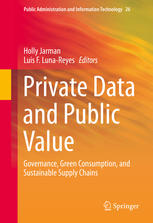

Most ebook files are in PDF format, so you can easily read them using various software such as Foxit Reader or directly on the Google Chrome browser.
Some ebook files are released by publishers in other formats such as .awz, .mobi, .epub, .fb2, etc. You may need to install specific software to read these formats on mobile/PC, such as Calibre.
Please read the tutorial at this link: https://ebookbell.com/faq
We offer FREE conversion to the popular formats you request; however, this may take some time. Therefore, right after payment, please email us, and we will try to provide the service as quickly as possible.
For some exceptional file formats or broken links (if any), please refrain from opening any disputes. Instead, email us first, and we will try to assist within a maximum of 6 hours.
EbookBell Team

4.3
8 reviewsThis book investigates the ways in which these systems can promote public value by encouraging the disclosure and reuse of privately-held data in ways that support collective values such as environmental sustainability. Supported by funding from the National Science Foundation, the authors' research team has been working on one such system, designed to enhance consumers ability to access information about the sustainability of the products that they buy and the supply chains that produce them. Pulled by rapidly developing technology and pushed by budget cuts, politicians and public managers are attempting to find ways to increase the public value of their actions. Policymakers are increasingly acknowledging the potential that lies in publicly disclosing more of the data that they hold, as well as incentivizing individuals and organizations to access, use, and combine it in new ways. Due to technological advances which include smarter phones, better ways to track objects and people as they travel, and more efficient data processing, it is now possible to build systems which use shared, transparent data in creative ways. The book adds to the current conversation among academics and practitioners about how to promote public value through data disclosure, focusing particularly on the roles that governments, businesses and non-profit actors can play in this process, making it of interest to both scholars and policy-makers.